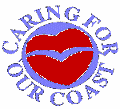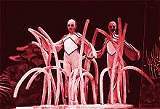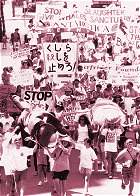Theme: Caring for our Coast
Seaweek '93 coordinator: Bob Moffatt & Glenn Tonges
It is all too often that the subtle, long term changes to our environment go largely unnoticed until a significant visible problem arises. The marine environment is no exception and perhaps the most subtle adverse changes occur here. There is a need to find out more, indeed the ocean's health should be everyone's concern.
All the world's population depend on a healthy marine environment for their survival. The ocean is a major part of the Earth's life support systems. Plants and animals depend on the coasts and oceans too. Turtles nest on the beaches; seabirds use the shore for breeding; mangroves, seagrass and saltmarshes provide rich nursery areas for all manners of fish and sea life and the list goes on. The theme 'Caring for our Coast' carries a message to all Australians that individuals who care, can make a difference. As the land and sea are connected, we all contribute to the health of our coasts and oceans. What we do each day at home, school or work and how we use and care for the land will affect the health of the oceans.  This theme helps to question why the ocean needs to be cared for and if we really do care. It includes issues of: This theme helps to question why the ocean needs to be cared for and if we really do care. It includes issues of:
- The significance and value of the coasts and oceans for us allConsequences of our every day actionsCatchment managementRegulations, roles and responsibilities
- Community groups and their projects
20 ways to care for our Coast |
|
|
'Punk Mermaids'
- Using drama, music and dance to interpret the sea
What
Ballet and drama performed by students and actors to schools and local communities.
Where
Townsville and Cairns.
How
The Great Barrier Reef Marine Park Authority worked with representatives from a group of organisations with management and educational interests in the marine environment. Together they developed a set of messages they wanted to deliver for Seaweek, focussing on awareness raising, specific issues and personal actions.
| Polyp, the first of four performances developed, was a major ballet production. Through evaluation, changes were made to broaden the reach and effectiveness of the shows. After Polyp came The Punk Mermaid, The Live Pop-up Plankton and The Blue Playground using drama, catchy songs, and puppets. The performances were taken out of the theatre and into the schools, markets, malls and shopping centres of Townsville and Cairns. |

Polyp |
Educational materials were sent to schools in preparation for a performance and displays were set up at community shows. This enabled students, teachers and the public to follow up on information or issues and explore ways their own actions could care for the sea. These shows educated and entertained thousands for Seaweek.
Why
|
Punk mermaids, a cheeky plankton, a grumpy beach towel and dancing coral polyps can help save the oceans by getting the users and abusers of the sea excited and receptive for some strong environmental education messages. By being creative they take people through the mental barrier of the water surface.
With movement, drama, dance, music, song and humour they present and involve people in the marine world in ways they have not experienced before. Leaping about singing and dancing can not only be great fun but it can also be dynamic environmental education. |

Local community groups draw attention to major environmental issues |
|
|